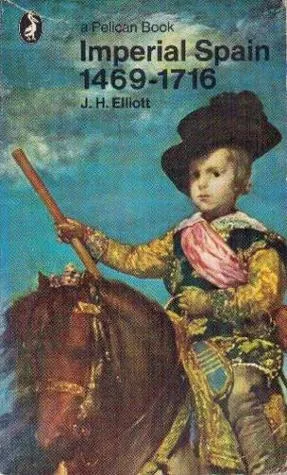Imperial Spain: 1469-1716

Unveiling the Epic Tapestry: "Imperial Spain: 1469-1716" by J.H. Elliott
A Historical Voyage with J.H. Elliott
Embark on a riveting historical voyage with J.H. Elliott's "Imperial Spain: 1469-1716." For anyone fascinated by the grandeur and complexities of imperial powers, this book is a treasure trove that peels back the layers of Spain's influential era.
Elliott's Mastery of Historical Narrative
J.H. Elliott, a maestro in historical storytelling, invites readers into the heart of Imperial Spain. As someone who has often found history to be a series of dates and events, Elliott's ability to weave a narrative turned the past into a vivid and engaging story.
The Formation of a Powerhouse
From Unification to Global Dominance
"Imperial Spain" begins with the marriage of Ferdinand of Aragon and Isabella of Castile, a union that united two powerful regions and laid the foundation for Spain's ascent. Elliott navigates through the unification process, painting a picture of a nation on the cusp of becoming a global powerhouse.
Anecdote: A Family Tree Rediscovered
Reading about the unification brought to mind a family tree project from school. Little did I know then that these historical figures were more than just names; they were architects of a mighty empire. Elliott's narrative unveiled the living history behind the names on my old family tree.
The Age of Exploration and Conquest
Voyages into the Unknown
The book unfolds the Age of Exploration, a period when Spanish adventurers set sail into the unknown, driven by a thirst for discovery and riches. Elliott captures the spirit of exploration, describing the audacity of figures like Columbus and Magellan.
Anecdote: Lessons from Seafaring Ancestors
Reflecting on seafaring ancestors, I was reminded of tales about the courage it took to embark on uncertain voyages. Elliott's portrayal of these maritime adventures brought a newfound appreciation for the resilience of those who sailed into the vastness of the uncharted seas.
The Golden Age and Its Cultural Flourish
A Renaissance of Arts and Letters
Elliott skillfully guides readers through the Golden Age, a period of cultural flourish that birthed artistic masterpieces and literary treasures. From the works of Cervantes to the paintings of Velázquez, Spain became a cultural hub that left an indelible mark on the world.
Anecdote: Brush Strokes and Storytelling
The exploration of the arts triggered memories of visiting museums and studying the brush strokes of masterpieces. Elliott's narrative not only painted a picture of the cultural landscape but also revealed the stories behind each stroke and word.
The Challenges of Global Dominion
Rivalries, Wars, and Economic Struggles
Imperial Spain faced its share of challenges, from conflicts with rival powers to economic struggles. Elliott doesn't shy away from detailing the complexities of maintaining a global dominion, revealing the internal and external pressures that tested Spain's imperial might.
Anecdote: Echoes of Economic Struggles
The economic struggles resonated with me as I reflected on the fluctuations in family fortunes across generations. Elliott's historical analysis provided a lens through which I could better understand the economic tides that shaped the destinies of families like mine.
Conclusion: An Ongoing Legacy
"Imperial Spain: 1469-1716" concludes not just with the decline but with the lasting legacy of Spain's imperial era. J.H. Elliott's narrative extends beyond dates and events; it explores the enduring impact of Imperial Spain on the world stage.
So, if you're ready to dive into a historical epic that unfolds like a captivating story, pick up "Imperial Spain" and let J.H. Elliott be your guide through the corridors of a bygone era.